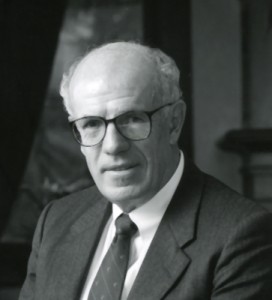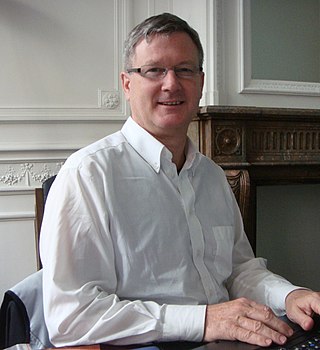A Doctor of Science is a science doctorate awarded in a number of countries throughout the world.
Vasant G. Honavar is an Indian-American computer scientist, and artificial intelligence, machine learning, big data, data science, causal inference, knowledge representation, bioinformatics and health informatics researcher and professor.

Paul Dourish is a computer scientist best known for his work and research at the intersection of computer science and social science. Born in Scotland, he holds the Steckler Endowed Chair of Information and Computer Science at the University of California, Irvine, where he joined the faculty in 2000, and where he directs the Steckler Center for Responsible, Ethical, and Accessible Technology. He is a Fellow of the AAAS, the ACM, and the BCS, and is a two-time winner of the ACM CSCW "Lasting Impact" award, in 2016 and 2021.

The Drexel University College of Computing & Informatics (CCI), formerly the College of Information Science and Technology or iSchool, is one of the primary colleges of Drexel University in Philadelphia, Pennsylvania. The College of Computing & Informatics has faculty and administrative offices, research laboratories, collaborative learning spaces, and classrooms located at 3675 Market Street Philadelphia, PA. The current dean is Yi Deng.
John Yen is Professor of Data Science and Professor-in-Charge of Data Science in the College of Information Sciences and Technology at Pennsylvania State University. He currently leads the Laboratory of AI for Cyber Security at Penn State. He was the founder and a former director of the Cancer Informatics Initiative there.
The College of Information Sciences and Technology, also known as the College of IST at Pennsylvania State University was established in 1999. Headquartered at the University Park campus in University Park, Pennsylvania, the college's programs are offered at 21 Penn State campus locations. Dr. Andrea Tapia currently serves as the college's interim dean.
Edward ("Ted") Hance Shortliffe is a Canadian-born American biomedical informatician, physician, and computer scientist. Shortliffe is a pioneer in the use of artificial intelligence in medicine. He was the principal developer of the clinical expert system MYCIN, one of the first rule-based artificial intelligence expert systems, which obtained clinical data interactively from a physician user and was used to diagnose and recommend treatment for severe infections. While never used in practice, its performance was shown to be comparable to and sometimes more accurate than that of Stanford infectious disease faculty. This spurred the development of a wide range of activity in the development of rule-based expert systems, knowledge representation, belief nets and other areas, and its design greatly influenced the subsequent development of computing in medicine.
Vimla Lodhia Patel is a Fijian-born Canadian cognitive psychologist and biomedical informaticist.
Mary Beth Rosson is the director of graduate programs and professor at the Penn State College of Information Sciences and Technology. Rosson also co-directs the collaboration and innovation lab. Most of her research concentrates on End User Programming, Computer Supported Cooperative Work (CSCW), and Human-Computer Interaction (HCI). Prior to teaching at Penn State, Rosson taught at the Virginia Tech Computer Science department for 10 years and worked as a research staff manager at IBM's Thomas J. Watson Research Center for 11 years. Rosson also served as the Dean for the Penn State College of Information Sciences and Technology from 2014 to 2016. Rosson earned her Ph.D. in experimental psychology in 1982 from the University of Texas at Austin and her Bachelors in Psychology from Trinity University(Texas) in 1977.

James Ze Wang is a Chinese-American computer scientist. He is a distinguished professor of the College of Information Sciences and Technology at Pennsylvania State University. He is also an affiliated professor of the Molecular, Cellular, and Integrative Biosciences Program; the Computational Science Graduate Minor; and the Social Data Analytics Graduate Program. He is co-director of the Intelligent Information Systems Laboratory. He was a visiting professor of the Robotics Institute at Carnegie Mellon University from 2007 to 2008. In 2011 and 2012, he served as a program manager in the Office of International Science and Engineering at the National Science Foundation. He is the second son of Chinese mathematician Wang Yuan.
Brian K. Smith is The Honorable David S. Nelson Professorial Chair and Associate Dean for Research at Boston College's School of Education and Human Development. Previously, he was senior associate dean of academic affairs at Drexel University's College of Computing and Informatics and dean of continuing education at Rhode Island School of Design. He also had appointments at MIT and Penn State, and has held rotation appointments at the National Science Foundation.

Homer Richards Warner was an American cardiologist who was an early proponent of medical informatics who pioneered many aspects of computer applications to medicine. Author of the book, Computer-Assisted Medical Decision-Making, published in 1979, he served as CIO for the University of Utah Health Sciences Center, as president of the American College of Medical Informatics, and was actively involved with the National Institutes of Health. He was first chair of the Department of Medical Informatics at the University of Utah School of Medicine, the first American medical program to formally offer a degree in medical informatics.
Informatics is the study of computational systems. According to the ACM Europe Council and Informatics Europe, informatics is synonymous with computer science and computing as a profession, in which the central notion is transformation of information. In some cases, the term "informatics" may also be used with different meanings, e.g. in the context of social computing, or in context of library science.
Computational informatics is a subfield of informatics that emphasizes issues in the design of computing solutions rather than its underlying infrastructure. Computational informatics can also be interpreted as the use of computational methods in the information sciences.

The Westgate Building, formerly known as Information Sciences and Technology Building is a classroom building at Pennsylvania State University. Construction was completed in January 2004.

Bernhard M. Hämmerli is a Swiss computer scientist in the fields of communications, networks, and information security, specifically critical infrastructure protection in the European Union. He is teaching internationally as a professor at both the Lucerne University of Applied Sciences and Norwegian University of Science and Technology. He was president of the Swiss Informatics Society from 2009 to 2014 and chair of the platform ICT Security of the Swiss Academy of Engineering Science from 2012. He has directed a new academic course, Cyber Security, at the Lucerne School of Information Technology from 2018.
Diana Elizabeth Forsythe was a leading researcher in anthropology and a key figure in the field of science and technology studies. She is recognized for her significant anthropological studies of artificial intelligence and informatics, as well as for her studies on the roles of gender and power in computer engineering.
Steven Burton Sawyer is a professor in the School of Information Studies at Syracuse University. He is known for his research on social and organizational informatics, how people work together and how they use technology, and the relationships among changing forms of work & organization. Sawyer has worked on improving the social components of teamwork, as well as the distinctions between packaged and custom software development. His research is done through field-based studies of software developers, scientific collaborators, scientific data repositories, real estate agents, police officers, organizational technologists, and similar information-intensive work settings.





